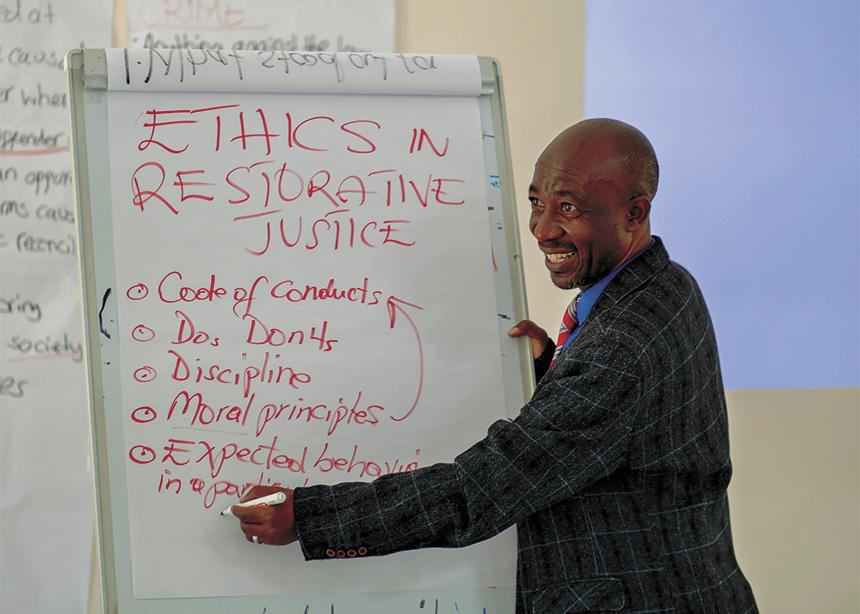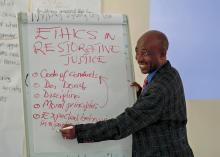A restorative justice curriculum has been introduced at 100 correctional facilities in Zambia and Malawi.
In 2019, Rod Friesen, Mennonite Central Committee (MCC) Ontario Restorative Justice Coordinator, was invited to facilitate a week-long training session for officers in the Zambian Correctional Service (ZCS). This training session was part of a pilot project of MCC Zambia in partnership with the Zambian government. Their goal was complete culture change within the Zambian corrections system.
The nature of the criminal justice system in Zambia was largely punitive—punishment for those who had broken the law without addressing how to restore either the victims of crime or the perpetrators. But representatives of the ZCS saw there could be a better way, built on the concepts of restorative justice. This approach addresses the needs of those who have been victimized, the community impacted by the crime and the offender.
It was important to MCC staff that ZCS personnel be taught how to give the training themselves. Now, four years since the first round of training, the fruits of that initial visit and the training provided are becoming apparent.
Issa Ebombolo, MCC Zambia and Malawi peacebuilding coordinator, says the training content Friesen created is being used at the ZCS staff training college for all officers and has been fully integrated into all 69 Zambian correctional facilities. The training is also being used by 31 correctional facilities in the neighbouring country of Malawi.
Ebombolo has a long resume of peacebuilding work across Africa, including time as a peace education facilitator in Zambian refugee camps with the UN High Commissioner for Refugees and time as chair of the MCC Africa Peace Network. He says the impact of the restorative justice project has been unique within the African continent. Once learned, restorative justice is embraced because it connects deeply with traditionally held values of village life. Those values centre around how a community works together to understand the harm done and repair it by bringing the harm-doer back into community with appropriate accountability.
An example of this has been the establishment of peace clubs within Zambian prisons. Zebron Mwale joined such a club. “After the message of peace anchored well in my heart, I quickly learned about the need to break the chain of revenge,” says Mwale. He was able to reconcile with his neighbour, who had reported him to the police for growing cannabis, a crime in Zambia. Mwale also secured a pardon and was released from prison for his improved behaviour.
The impact of the training continues to grow, and it will soon be available to 20 countries that will have access to the training content for their correctional facilities.
Ebombolo uses the story of the mango seed to illustrate how this project has grown. He says when we scatter seeds, we do not know which ones will grow. We may be surprised many years later when we come back to the village to see that others are eating from this big tree we planted.
“Sometimes it is only our grandchildren or our great-grandchildren that will see the changes from the seeds we sow.”




Add new comment
Canadian Mennonite invites comments and encourages constructive discussion about our content. Actual full names (first and last) are required. Comments are moderated and may be edited. They will not appear online until approved and will be posted during business hours. Some comments may be reproduced in print.